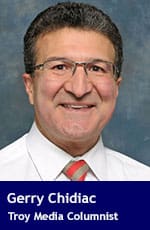Healing the world: Each of us plays a small but important part in the victory over injustice and suffering

For interview requests, click here
With the new year upon us, many of us will make resolutions and set goals. While this is a good exercise, there is one important thing we need to keep in mind. In discussing the spiritual concept of “healing the world,” Jewish-Canadian physician Gabor Maté states, “The task is not yours to finish.”
There is nothing more meaningful, no more significant source of long-term happiness, than being part of the healing process for our broken world. It is not about how much money we have, how many clicks we get on our social media feeds, what political office we attain, or how many awards we win. Nothing matters more than the kindness, respect, love, and goodness we bring into the lives of the people we interact with.
 |
| Recommended |
| Response to the murder of United Healthcare CEO reveals a deep moral crisis
|
| Canadian Conservatism has lost its way
|
| What the Amsterdam riot teaches us about modern media
|
Yet, when we look around us, we see suffering, death, and even genocide. We see famine, disease, and beautiful children being used as either human shields or for target practice. We see people doing evil things who are unlikely to ever be held accountable for the harm they are causing. If the world is a rat race, then as comedian Paul Lynde stated, “The rats are winning.”
It seems preposterous to say, “The arc of the moral universe bends toward justice.” The weapons only get bigger, more powerful, and more destructive. The wage gap only grows, and it seems that those who have lost all moral principles and respect for the dignity of life control our economy. Those who stand up for the well-being of their neighbours are demeaned, threatened, condemned, arrested, or ignored.
But hasn’t the world always been this way? Even when the message of Jesus gained prominence in Europe, it was bastardized, hijacked, and used to justify slavery and colonization. If even Jesus couldn’t change the world, what hope is there for any of us to make a positive impact?
We need to step back and hear the words of Dr. Maté: The task is not for us to finish. We have no idea of the positive and long-lasting impact we are making. Dr. Peter Bryce, for example, meticulously documented the alarming mortality rates of Indigenous children in residential schools due to tuberculosis in the early 20th century. No one listened to him, and he died thinking he had failed to make an impact. His documentation of this “national crime” surfaced again in the 1990s and has played a significant role in the truth and reconciliation process currently underway in Canada as we try to heal from the cruelty of our past.
I have spent much of my career teaching and trying to understand the concept of genocide. I was inspired by teachers, friends, and mentors who believed in the dignity of every person. I learned that I am a gifted and talented individual, and with that gift comes a responsibility to heal the world. It has been my task to figure out what that means and how it is to be lived out. Truth be told, this is the central motif of everything I do in the classroom and in my writing.
While I know that my students generally enjoy my classes, I have no idea of the long-term impact I am having on their lives. Will they go on to heal the world and teach others to do the same, despite my faults and the powerful forces trying to deter them? I don’t know. I can only hope.
The arc of the moral universe bends toward justice. There is no more trans-Atlantic slave trade, and now we understand that genocide only happens when we dehumanize our neighbour. The heartbreaking truth, however, is that innocent people – beautiful, wonderful people – continue to be killed on a massive scale.
May the arc of the moral universe bend toward justice in 2025 and in the years to come, and may each of us play a small part in that victory.
Happy New Year.
Gerry Chidiac specializes in languages and genocide studies and works with at-risk students. He received an award from the Vancouver Holocaust Education Centre for excellence in teaching about the Holocaust.
Troy Media is committed to empowering Canadian community news outlets by providing independent, insightful analysis and commentary. Our mission is to support local media in building an informed and engaged public by delivering reliable content that strengthens community connections, enriches national conversations, and helps Canadians learn from and understand each other better.


